Demagoguery in Haiti - September 8, 2003 |
|
|
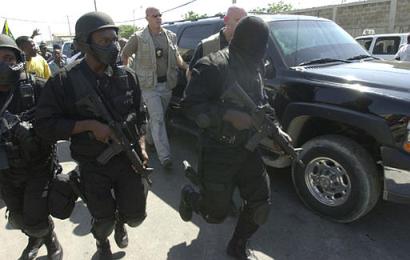 |
| Helmeted members of the Haitian National Palace CAT team and US security
guards try to keep frenzied supporters back from the vehicle carrying President
Jean-Bertrand Aristide as he left the Electricity of Haiti plant in Cite Soleil, Haiti, on
Monday, Sept. 8, 2003, after he inspected recently installed turbines and promised the
government is working to give the greater capital area 24-hour-a-day power by the end of
the year. (AP Photo/Daniel Morel) |
|
|
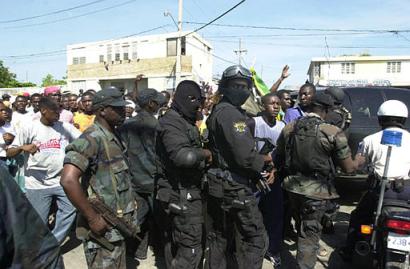 |
| Helmeted members of the Haitian National Palace CAT team try to keep
frenzied supporters back from the vehicle carrying President Jean-Bertrand Aristide as he
left the Electricity of Haiti plant in Cite Soleil, Haiti, on Monday, Sept. 8, 2003, where
he inspected recently installed turbines and promised the government is working to give
the greater capital area 24-hour-a-day power by the end of the year. (AP Photo/Daniel
Morel) |
|
|
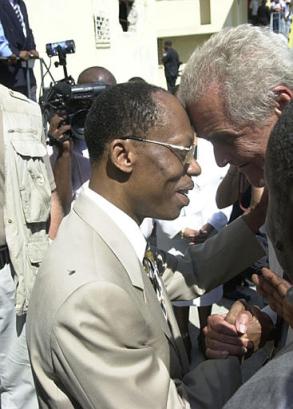
|
| Haitian President Jean-Bertrand Aristide, left, touches foreheads in the
traditional priests' greeting with Father Arthur Volel of Cite Soleil, right, after a
visit to the Electricity of Haiti plant in Cite Soleil, Haiti, on Monday, Sept. 8, 2003,
where he visited recently installed turbines and promised the government is working to
give the greater capital area 24-hour-a-day power by the end of the year. Currently the
cities and neighborhoods of the capital region only receive a few hours of electricity,
sometimes only once every few days. When Aristide was a priest, he worked with Volel in
Cite Soleil. (AP Photo/Daniel Morel) |
|
|
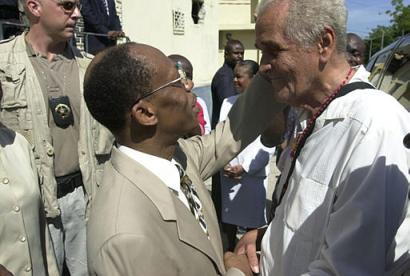 |
| Haitian President Jean-Bertrand Aristide, left, pats the head of Father Arthur Volel
of Cite Soleil, right, after a visit to the Electricity of Haiti plant in Cite Soleil,
Haiti, on Monday, Sept. 8, 2003, where he visited recently installed turbines and promised
the government is working to give the greater capital area 24-hour-a-day power by the end
of the year. Currently the cities and neighborhoods of the capital region only receive a
few hours of electricity, sometimes only once every few days. When Aristide was a priest,
he worked with Volel in Cite Soleil. (AP Photo/Daniel Morel) |
|
|
|
|

|
| Haitian President Jean-Bertrand Aristide, right, holds an envelope he
received from a supporter and blows a kiss to a frenzied crowd outside the Electricity of
Haiti plant in Cite Soleil, Haiti, on Monday, Sept. 8, 2003, after he visited recently
installed turbines and promised the government is working to give the greater capital area
24-hour-a-day power by the end of the year. Currently the cities and neighborhoods of the
capital region only receive a few hours of electricity, sometimes only once every few
days. (AP Photo/Daniel Morel) |
|
|
 |
| Haitian President Jean-Bertrand Aristide, right, holds an envelope he
received from a supporter and greets a frenzied crowd outside the Electricity of Haiti
plant in Cite Soleil, Haiti, on Monday, September 8, 2003, after he visited recently
installed turbines and promised the government is working to give the greater capital area
24-hour-a-day power by the end of the year. Currently the cities and neighborhoods of the
capital region only receive a few hours of electricity, sometimes only once every few
days. (AP Photo/Daniel Morel) |
|
|
Fishing, the Haitian way - September 8, 2003 |
|
|
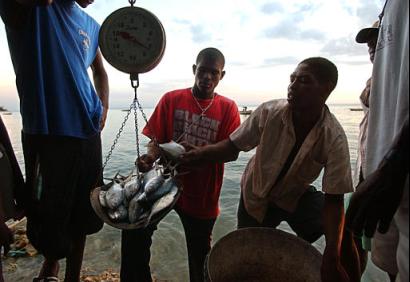 |
| Sergio Telemagues, right, places the last fish, a jack, on his catch for
the day as others weigh it to pay him in the fishing village of Lully, Haiti, Saturday,
Sept. 6, 2003. The Telemagues family takes to the sea each day under a makeshift sail,
hunting for what is left in the over-fished, polluted waters that line the Haitian coast.
Lacking motors and a more seaworthy craft, much of Haiti's fishing fleet must stay in the
contaminated waters close to shore, where fish are scarce. (AP Photo/Gregory Bull) |
|
|
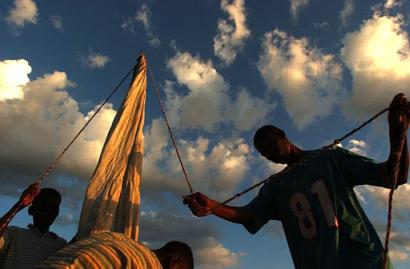 |
| Three brothers, Abraham, right, Suhio, center, and Jordany Telemagues tie
down a folded sail on their fishing boat in waters off the coast near Lully, Haiti,
Friday, Sept. 5, 2003. The Telemagues family takes to the sea each day under a makeshift
sail, hunting for what is left in the over-fished, polluted waters that line the Haitian
coast. Lacking motors and a more seaworthy craft, much of Haiti's fishing fleet must stay
in the contaminated waters close to shore, where fish are scarce. (AP Photo/Gregory Bull) |
|
|
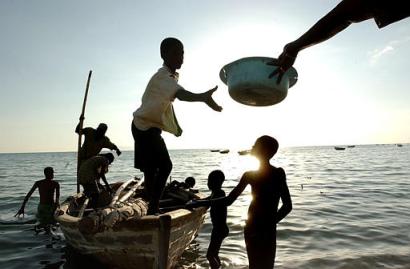 |
| Jordany Telemagues, center, is handed a bowl by a relative as he and his brothers load
their tiny fishing boat in the coastal town of Lully, Haiti, Friday, Sept. 5, 2003. The
Telemagues family takes to the sea each day under a makeshift sail, hunting for what is
left in the over-fished, polluted waters that line the Haitian coast. Lacking motors and a
more seaworthy craft, much of Haiti's fishing fleet must stay in the contaminated
watersclose to shore, where fish are scarce. (AP Photo/Gregory Bull) |
|
|
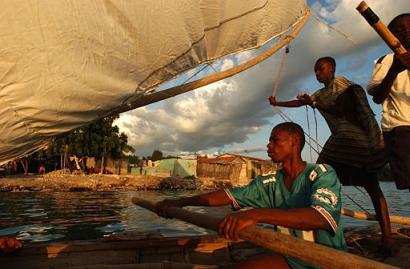 |
| Three brothers, Abraham, left, Suhio, center, and Gladimy Telemagues guide their
family's fishing sailboat close to the coast near Lully, Haiti, Friday, Sept. 5, 2003. The
Telemagues family takes to the sea each day under a makeshift sail, hunting for what is
left in the over-fished, polluted waters that line the Haitian coast. Lacking motors and a
more seaworthy craft, much of Haiti's fishing fleet must stay in the contaminated waters
close to shore, where fish are scarce. (AP Photo/Gregory Bull) |
|
|
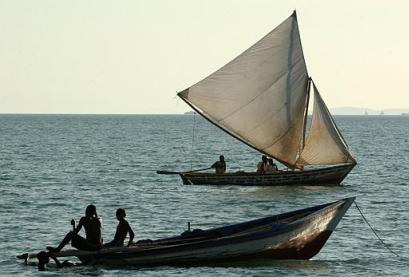 |
| Children swim of the end of a fishing boat as another makes its way along the coast
near Lully, Haiti, Saturday, Sept. 6, 2003. Lacking motors and a more seaworthy craft,
much of Haiti's fishing fleet must stay in the contaminated waters close to shore, where
fish are scarce. (AP Photo/Gregory Bull) |
|
|
Traveling the Haitian way - September 8, 2003 |
|
|
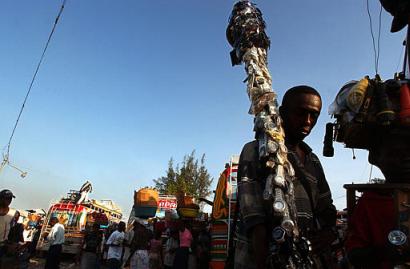 |
| Gaspar Moreno sells watches and sunglasses to people boarding buses en route to
Jacmal, in downtown Port-au-Prince, Haiti, Sunday, Sept. 7, 2003. (AP Photo/Gregory Bull) |
|
|
|
|
|
|











